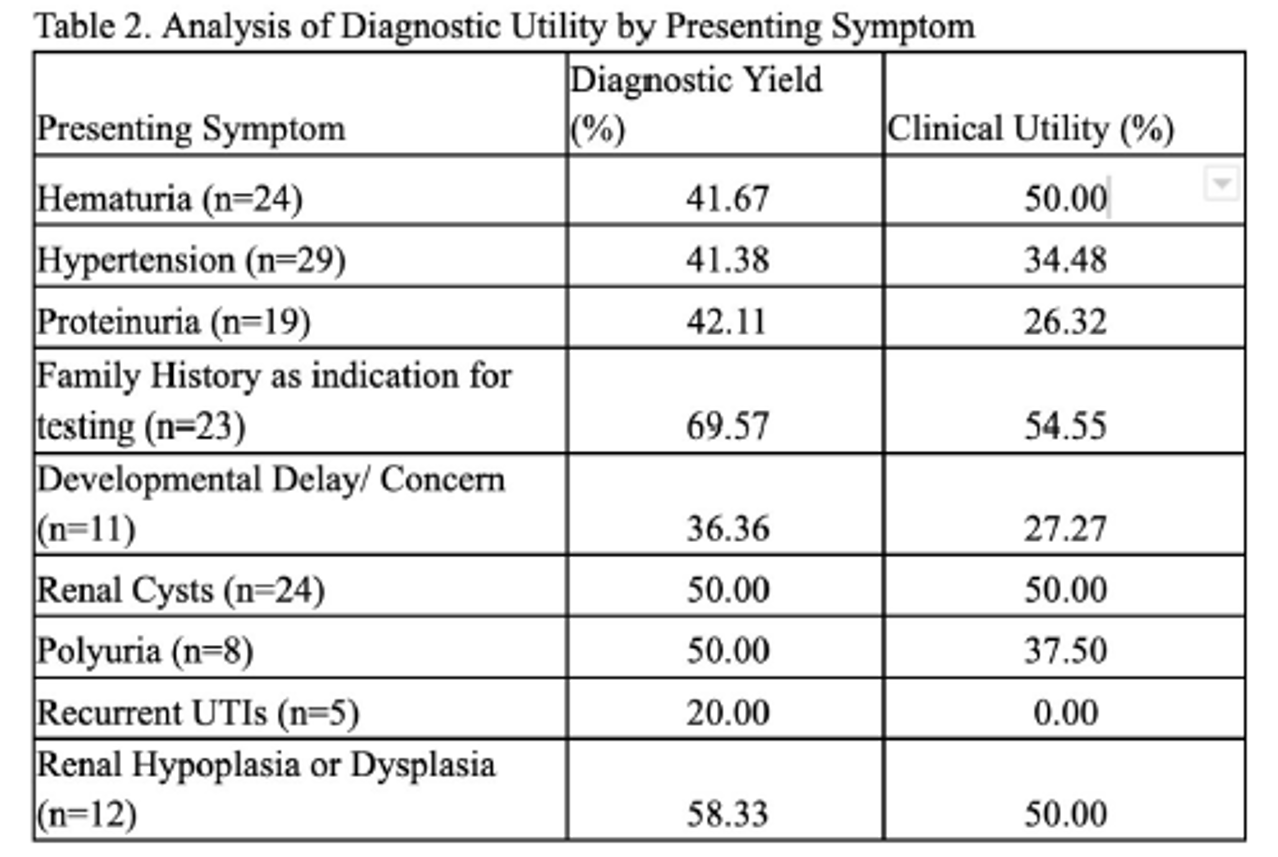Nephrology: Clinical
Nephrology 2: CAKUT/Genetic Clinical and Basic Science
274 - Clinical and Diagnostic Utility of Genetic Testing in Pediatric Nephrology
Saturday, April 29, 2023
3:30 PM - 6:00 PM ET
Poster Number: 274
Publication Number: 274.251
Publication Number: 274.251
SUSHIL GUPTA, Riley Hospital for Children at Indiana University Health, INDIANAPOLIS, IN, United States; Hope Tominack, Indiana University School of Medicine, Evansville, IN, United States
- SG
Sushil Gupta, MD (he/him/his)
Associate Professor
Riley Hospital for Children at Indiana University Health
INDIANAPOLIS, Indiana, United States
Presenting Author(s)
Background: Approximately 30% of chronic kidney disease (CKD) in children is inherited.1 In addition to confirming a diagnosis, knowledge of a patient’s genotype can guide treatment plans and be informative in regards to prognosis. However, the clinical and diagnostic utility of genetic testing in pediatric nephrology is not well described in the literature.
Objective: Results of his study will shed light on the benefits of testing, to facilitate clinicians determining whether testing is worth the costs, which can exceed $2,000 per test. Costs can be even higher in the case that testing did not yield a diagnosis and further testing is required.
Design/Methods: Retrospective chart reviews of 88 patients who underwent Renasight genetic testing at Riley Hospital for Children were conducted. Renasight genetic testing is a Next-Generation Sequencing (NGS) Whole Exome Sequencing panel that screens for 385 of the most common genetic conditions causing Chronic Kidney Disease (CKD). Utility of genetic testing was assessed through a variety of parameters, including whether genetic results yielded a diagnosis or informed future care, among others.
Results: Genetic testing yielded a positive result in ~42% of tests, carrier status in ~28% of cases and Variants of Unknown Significance (VUS) only in ~26% of cases. In patients with positive results or conditions with a symptomatic carrier status, genetic testing influenced patient management through medication changes, prevention of additional procedures and changes in frequency of labs and provider follow-up. Outside treatment course, genetic counseling afforded by results proved valuable through recommendations such as diet changes and lifestyle modifications, education regarding reproductive genetic health, and cascade testing of family. Conditions with the highest diagnostic yields included Autosomal Dominant Polycystic Kidney Disease (ADPKD), Gitelman Syndrome, and Alport Syndrome. Significantly, testing in search of genetic causes of hypertension in 14 cases demonstrated no diagnostic or clinical utility. Indications for testing with the highest diagnostic yield included family history, renal hypoplasia/dysplasia, polyuria, and renal cysts.
Conclusion(s): Genetic testing in pediatric nephrology offers a wide scope of clinical and diagnostic utility. Based on the results of this study, indications for testing that offer the highest diagnostic yields include family history and renal dysplasia/hypoplasia. In addition to diagnosis, patients benefitted from genetic testing through education as well as alterations in treatment course and monitoring.
.png)
.png)

